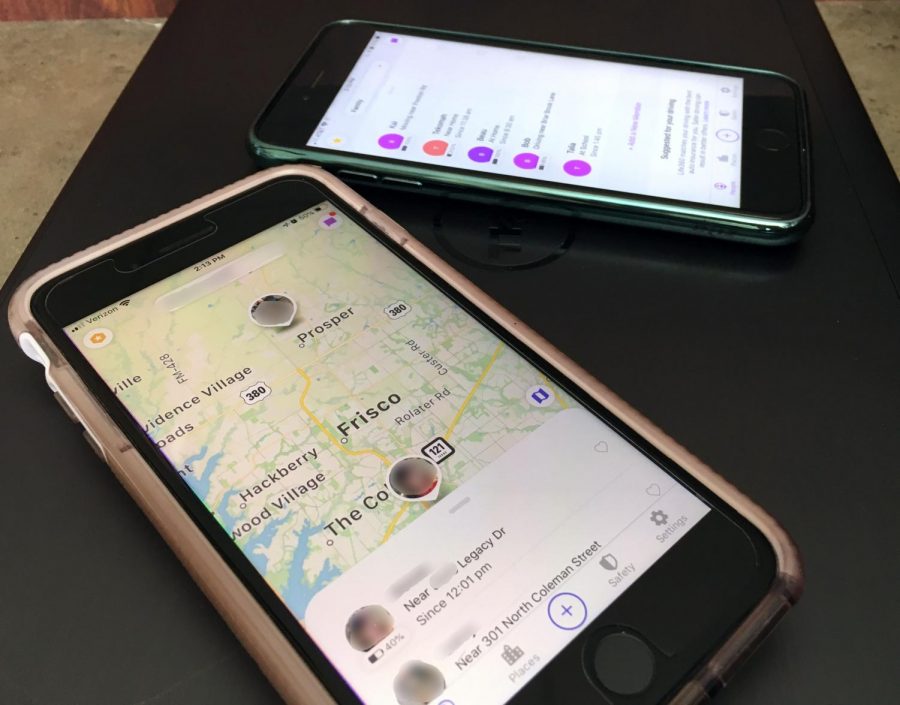Editorial: Life 360 – Safe Parenting or Surveillance Parenting?
Two cell phones show Life 360 notifications and location maps. As of 2018, 18 million families use Life 360. “An important part of development for teenagers is gaining their parents’ trust,” ENO staff writers said. “While it is understandable to download a location app for students who break that trust, it is very frustrating and demeaning for students who have no real reason to download the app.”
Students examine issues that come with family tracking
With location-tracking at the fingertips of every parent and student, safety seems like it is only one notification away – at least to parents it does.
Location tracking creates more problems than solutions, and it should be used as rarely as possible.
As demonstrated by every high school across America and presented on LetGrow.org, 80 percent of teenagers have their own phones. While this is always a conversation topic with adults, it is also the most common excuse for location-tracking apps. Because students always have their phones on them, they might as well be tracked. While these apps serve a good purpose and can be literal lifesavers in the case of an emergency, excessive use is impractical and violating.
An important part of development for teenagers includes gaining their parents’ trust. While it is understandable to require the download of a location app for students who break that trust, it is frustrating and demeaning for students who have no real reason to download the app. According to a Wired survey, 58 percent of parents look at their kid’s search histories, texts and locations. That means more than half of parents break that trust between their kids, and while a good amount of those parents have valid reasons to check up on their child’s online history, some parents are just taking these measures out of fear.
Furthermore, these “free” location-tracking apps don’t run out of the goodness of their hearts or for the sole purpose of family safety. They have to make a profit somewhere, and for these apps, the business is in the personal information. Apps like Life 360 use location-based demographics to sell information to advertisement companies and political campaigns.
As of 2018, around 16 percent of parents use location-tracking apps actively. While this number doesn’t seem significant at first glance, it shouldn’t get any bigger. This doesn’t mean delete the app. In fact, the app really can be useful when it is used in moderation and only when necessary. However, when a parent starts checking the app every day, it starts to tilt over the line of safety and surveillance.
To prevent overuse of Life 360 and other family-tracking apps, parents can set up a “one-time deal” with their kids. Once a child breaks their parent’s trust, then they have to download the app. Or, similar to screen-time limits, parents who check the app consistently for no real reason can start setting limits on themselves. Check the app only twice a day or only when really necessary.
Parents are always worried about safety. That’s their job. But keeping a child under endless surveillance does the opposite, and ultimately, it hurts the parent-child relationship.
Haley Medeiros penned this editorial on behalf of the editorial board of EagleNationOnline.com.
Your donation will support the student journalists of Prosper High School. Your contribution will allow us to purchase equipment and cover our annual website hosting costs.







![Freshman Polly Greaves created this updated version of the original graphic through Canva. Their next episode reviews a science fiction novel, 'Ender's Game.' "I feel like [Orson Scott Card] did a really good job incorporating feelings into his words and the plot," Greaves said, "which really made it a work of art because I believe that good books are books that can make you feel something."](https://eaglenationonline.com/wp-content/uploads/2025/02/EndersGame_Cover3-600x420.png)






